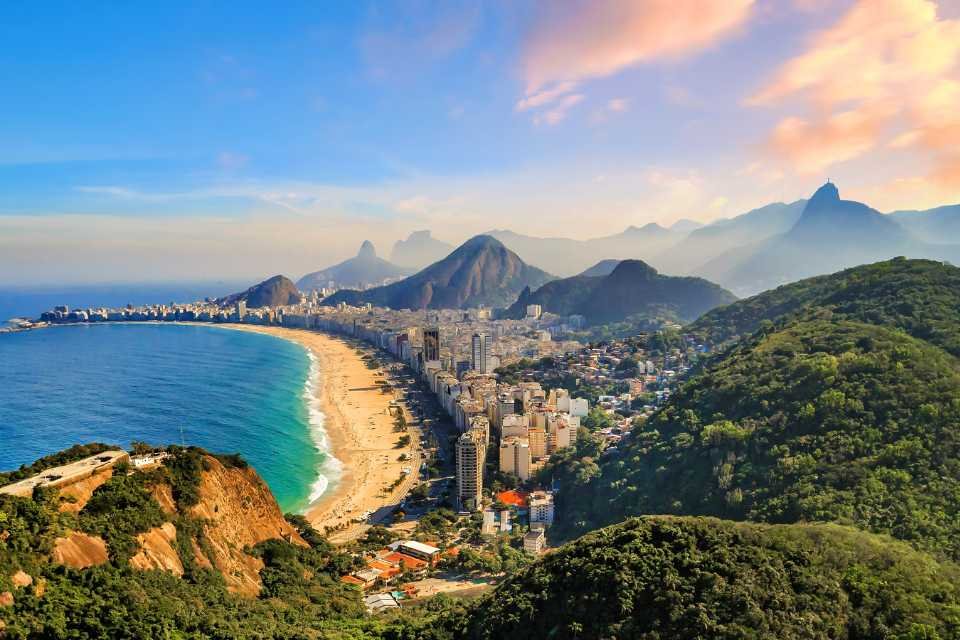The ultimate Rio de Janeiro travel guide
Call yourself a true Carioca after reading this Rio guide
If you're planning a trip to Rio de Janeiro, you've come to the right place! This ultimate guide to Rio de Janeiro will provide you with all the information you need to make your dream vacation a reality. From the best attractions to the most delicious restaurants, you'll have everything you need to know to experience the city like a local. Whether you're looking to explore the sights and sounds of downtown Rio or soak up some sun on the beaches, this guide has you covered. Read on to learn more about the spectacular city of Rio de Janeiro!
About Rio de Janeiro
Rio de Janeiro is the second largest city in Brazil, located in the southeast region of the country. Known as the “Cidade Maravilhosa” or “Marvellous City”, Rio de Janeiro is home to 6.32 million people and has a reputation as one of the most vibrant cities in South America.
Rio de Janeiro is most famous for its breathtaking beaches, stunning landscape and incredible nightlife. Some of the city’s most iconic attractions include Christ the Redeemer, Sugarloaf Mountain and Copacabana beach. But beyond its well-known landmarks, Rio de Janeiro is also renowned for its delicious cuisine, vibrant culture and rich history.
The city is divided into several districts, each with its own unique character and attractions. The Centro district is home to important cultural institutions and historical monuments, while the South Zone is known for its beautiful beaches and popular tourist spots. Visitors to the city can explore Ipanema and Leblon, two affluent neighborhoods with upscale shops and trendy bars, as well as get lost in the winding streets of Santa Teresa, a bohemian hilltop neighborhood.
There is truly something for everyone in Rio de Janeiro. From its breathtaking views to its samba-filled nights, it is no surprise that this Marvellous City is one of the world’s most beloved destinations.
Getting there
Rio de Janeiro is easily accessible by air, and there are several airports in the area that offer direct flights to Rio from major cities around the world. The two main airports are the Galeão International Airport and Santos Dumont Airport. Galeão International Airport is located in the north of the city and is the largest airport in Brazil. It serves all international flights and some domestic flights. Santos Dumont Airport is located in the center of Rio and mainly serves domestic flights.
Most international travellers will fly into Galeão International Airport. There are plenty of taxis outside the airport, and you can arrange for a shuttle service through your hotel. You can also take a bus from the airport to your hotel, although it's not recommended for travelers with lots of luggage.
Read: How to get to Rio de Janeiro from the airport
Another option is to take a ferry to Rio de Janeiro. Ferries depart from several cities around Brazil, including Angra dos Reis, Ilha Grande, Niteroi, Paraty, and Buzios. The journey time depends on which port you're departing from, but most ferries will take around 1-3 hours to reach Rio.
Finally, if you're traveling within Brazil, you can take an overnight bus to Rio de Janeiro. Overnight buses depart from various cities in Brazil and arrive in Rio early in the morning. This is a great way to save money and time if you're not in a hurry to reach your destination.
What is Rio famous for?
Rio de Janeiro is world-renowned for its breathtaking landscape, lively culture, vibrant nightlife, and incredible beaches. Rio is also home to some of the country's most iconic landmarks, such as the Christ the Redeemer statue on Corcovado mountain, Sugarloaf mountain, and the Favelas.
Rio is known for its vibrant Carnival celebration which takes place every year and draws millions of tourists from all over the world. Here you can experience the energy and passion of Brazilians as they come together to celebrate with music, dancing, parades, and costumes. During Carnival time, Rio is alive with energy and activity and there is something for everyone to enjoy.
Rio is also known for its many stunning beaches, such as Copacabana, Ipanema, and Leblon. All three are popular with tourists, who come to relax on the white sand beaches or take part in water activities such as surfing or sailing.
In addition to its natural beauty, Rio de Janeiro is home to a number of cultural institutions, such as the National Historical Museum, which offers a glimpse into the city’s history and culture. There are also several theaters where visitors can watch performances of ballets, plays, or operas. The Botanical Garden is also a popular attraction where visitors can wander through acres of beautiful plants and trees.
The food scene in Rio de Janeiro is also worth exploring. From traditional Brazilian cuisine to international dishes, you can find a variety of restaurants that suit every taste. As for nightlife, Rio has plenty of bars and clubs where you can party until the early hours.
All in all, Rio de Janeiro is an unforgettable destination and a must-visit for anyone who wants to explore the beauty of Brazil.
Where to stay
Rio de Janeiro is home to some of the most luxurious hotels in the world, but there are also plenty of affordable options to fit any budget. Whether you're looking for a beachfront resort or an urban apartment, here are some great places to stay during your Rio de Janeiro adventure:
Rio de Janeiro boasts some of the best luxury hotel accommodation in South America. Popular spots include Copacabana Palace and Fasano Rio, both situated on one of the city's iconic beaches.
A popular option for longer stays in Rio de Janeiro is to rent an apartment. VRBO has plenty of options ranging from basic studio apartments to luxury penthouses. For those looking for something more authentic, try Alugue Temporada for a selection of apartments in residential buildings across Rio.
If you're looking for an affordable option for your stay in Rio, then hostels are the way to go. Some of the best hostels in the city include Rio Downtown Santana Hostel and Mambembe Hostel. These provide clean and comfortable rooms as well as plenty of social activities.
For those looking for an outdoor experience, camping is an option in Rio. There are several campsites located within city limits, such as Prainha and Forte de Copacabana. Keep in mind that these can get crowded on weekends and during peak holiday periods.
What to eat
When in Rio de Janeiro, make sure to try the various traditional dishes that make up the Brazilian cuisine. Feijoada is one of the most popular dishes in the city and consists of black beans stewed with pork, beef, and sausage.
Another local favorite is Moqueca de Peixe, a fish stew served with coconut milk and spices. Churrasco is a type of barbecue where different types of meat are grilled on skewers over hot coals.
If you’re looking for something sweet, try Brigadeiros, small balls of chocolate made with condensed milk.
For a quick snack, grab a Pão de Queijo, which is a soft cheese roll. Finally, make sure to grab an Acai bowl, which is a refreshing blend of frozen acai berries, banana, and guarana syrup.
The best things to do in Rio de Janeiro
Visit Copacabana and Ipanema beaches
Enjoy the vibrant nightlife, white sand and beautiful views of the Atlantic Ocean, as well as some Samba music and potentially a handful of cocktails before the sun has even set! Both Copacabana and Ipanema beaches are hubs for the city, with residents heading there after finishing work to catch the last rays and maybe even grab dinner.
Take a cable car ride up to Sugarloaf Mountain
Admire the stunning views of Rio from the top of Sugarloaf Mountain and grab those up-close shots of Cristo Redentor.
Carnival
Every February, Rio’s world-famous carnival kicks into action, with floats, extravagant outfits and often an important message about years behind and ahead. Although now more inclusive than ever, the carnival has famously welcomed people from all walks of life to participate and celebrate.
Explore the Jardim Botanico
Stroll through the lush botanical gardens of Rio and learn about its diverse flora and fauna.
Visit Corcovado Mountain
Check out the iconic Christ the Redeemer statue for some amazing views of the city. Don’t forget to take the cog train.
Hang out at Lapa Steps
See the colorful street art on the steps and get lost in the atmosphere of the lively Lapa district. Nightlife here is exciting, but stick to a group or make friends with locals who you trust!
Take a tour of Santa Teresa
Explore this historic and artistic neighborhood with its cobblestone streets and colonial houses.
Go shopping at Centro
Find some great deals on fashion, jewelry and other souvenirs in the bustling center of Rio.
Head to one of Rio’s famous nightclubs
Whether you’re looking for live music or a dance party, Rio has something for everyone! Copacabana and Ipanema beaches are great starting points for a late afternoon / early evening soiree.
Explore Tijuca National Park
A gigantic national park within Rio’s city limits offers endless hiking trails, wildlife, and a taste of the rainforest without venturing too far from the city.
Read: Tijuca National Park travel guide
Take a day trip to Ilha Grande
Escape to this tropical paradise for some beach lounging and island hopping.
Watch a football match at Maracanã Stadium
Get tickets to see Flamengo or Fluminense, two of Brazil’s biggest football teams who call the stadium. If you aren’t a Flamengo or Fluminense fan, then Botafogo and Vasco both play in Brazil’s top leagues.
How to get around
Getting around Rio de Janeiro is relatively easy. The city is served by an extensive public transportation system, including metro, buses, and ferries. Taxis are also widely available and generally quite affordable.
Metro
The Rio de Janeiro Metro is the quickest way to get around the city. The metro runs on three lines and has 41 stations, with stops at the most popular tourist attractions. It’s easy to use, and tickets can be purchased from the station vending machines.
Buses
Buses are another great option for getting around Rio. They have an extensive network throughout the city, so it’s easy to find a bus that can take you where you need to go. Tickets can be purchased from the driver.
Ferries
A fun way to get around the city is by ferry. There are four ferry lines that offer services between Rio’s major ports. Tickets can be purchased onboard.
Taxis
Taxis are a convenient way to get around Rio, as they are widely available and generally quite affordable. Make sure to always get into a taxi that is marked as “Radio Taxi” or has a recognizable logo such as “Lotação”. It’s best to avoid unmarked taxis as they may not be safe.
Important information
Rio de Janeiro is a very popular tourist destination and the city is filled with many different attractions, activities, and events. It is important to be aware of the local laws and customs before visiting the city. Here are some important things to know when planning your trip to Rio de Janeiro:
Language
The official language in Rio is Portuguese, but English is widely spoken in tourist areas.
Currency
The currency in Brazil is the Real (BRL). Most establishments accept both cash and credit cards.
Emergency numbers
In case of an emergency, call 190 for the police, 192 for an ambulance, and 193 for the fire department.
Is Rio de Janeiro safe?
Rio de Janeiro is a huge South American city, with the typical huge South American city problems. Petty crime such as pickpocketing and purse snatching are common in crowded areas and tourists should always remain vigilant. Taking precautions such as not carrying expensive items, staying away from unknown areas, and taking taxis at night will help reduce the risks of theft.
When it comes to violent crime, Rio de Janeiro is known for its high rates of violence, particularly in the favelas. However, most of the violence is localised to these areas and tourists are unlikely to be targeted. To stay safe, steer clear of favelas unless on a group tour, and don’t look like a tourist!
You should also be aware of local laws, as Brazilian law can be quite different from that of other countries. As long as you abide by the law and stay vigilant, you should have a safe and enjoyable stay in Rio de Janeiro.
Rio de Janeiro travel tips
If you plan to travel within the city, use public transportation such as buses and metro
Carry small bills with you in order to make sure you can pay for small purchases
Stay vigilant and keep an eye on your belongings, as pickpockets are common in the city
If you are planning to use the beach, always be aware of the rip tides
Dress appropriately when visiting churches and other religious sites
To save money, try eating street food
Stay hydrated while exploring the city
If you are planning to go out at night, it’s best to stay in a group
Respect the local laws and customs
Rio de Janeiro FAQS
Q: Is Rio de Janeiro a safe city to visit?
A: The safety of Rio de Janeiro depends on the area you are in. Generally, tourists should be careful and aware of their surroundings. If you are staying in a tourist-friendly area, the chances of something happening to you are low.
Q: What is the best time of year to visit Rio de Janeiro?
A: The best time to visit Rio de Janeiro depends on your preference and the type of experience you are looking for. Generally, December through February is the peak season as it offers hot and sunny weather. However, if you prefer cooler temperatures and fewer crowds, April to October may be better for you.
Q: How can I get around Rio de Janeiro?
A: The most popular way to get around Rio de Janeiro is by bus or metro. Other options include taxi, Uber, walking, and bike-sharing.
Q: What type of currency does Rio de Janeiro use?
A: The currency used in Rio de Janeiro is the Brazilian Real (BRL). It is advisable to exchange your foreign currency into BRL when arriving in Brazil.
Q: What language is spoken in Rio de Janeiro?
A: Portuguese is the official language of Rio de Janeiro and the primary language spoken throughout the city. However, many people do speak English, particularly those involved in the tourism industry.















